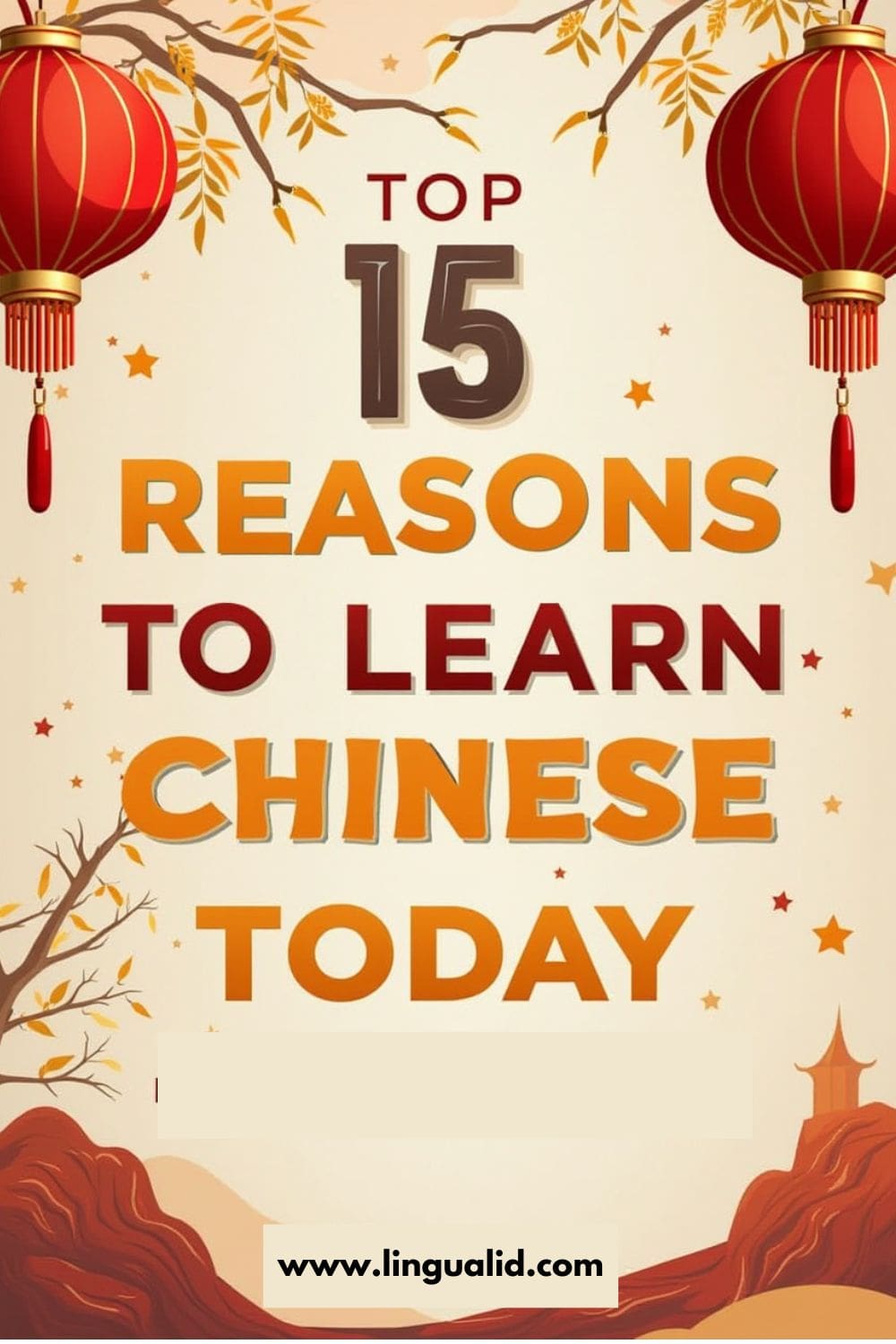In this post we will discuss the top reasons to learn Chinese. Chinese is the most spoken language worldwide, with over 1.3 billion native speakers. Mandarin, a dialect of Chinese, has about 1.1 billion speakers. This makes Mandarin the most spoken language globally. Learning Chinese opens a door to a 3,000-year-old civilization and offers many career and cultural benefits.

China’s growing economic power makes speaking Chinese very valuable. It’s useful in many fields like trade, technology, and education. Knowing Mandarin can lead to many job opportunities in China and around the world.
Learning Chinese also gives you a peek into China’s rich history and culture. You can explore ancient texts and modern arts. It helps you connect deeply with one of the world’s most influential cultures.
Key Takeaways
- Chinese is the most widely spoken language globally, with over 1.3 billion native speakers.
- Mastering Mandarin Chinese can open up a wide range of career opportunities, particular in fields like trade, technology, and education.
- Learning Chinese provides valuable insights into the country’s ancient history, philosophy, and cultural traditions.
- China’s rapid economic growth and global influence make Chinese language skills increasingly valuable for personal and professional development.
- The Chinese language offers a unique cognitive challenge that can enhance brain development and problem-solving abilities.
- Key Takeaways
- The Rise of China's Economic Power
- Chinese as a Language of International Business
- Global Cultural Influence
- Ancient Chinese Philosophy and History
- Modern Chinese Arts and Entertainment
- Traditional Festivals and Customs
- Exploring Chinese-Speaking Regions
- Building International Relationships
- Understanding Local Customs
- Chinese Cinema and Television
- Literature and Digital Content
- Social Media Platforms
- Exploring the Diverse Flavors of Chinese Cuisine
- What are the main reasons to learn Chinese in 2024?
- Why is Mandarin Chinese growing in global importance?
- What career opportunities and professional growth can learning Chinese provide?
- How can learning Chinese enhance cultural understanding?
- Is the Chinese language difficult to learn?
- How can learning Chinese enhance travel experiences?
- What are the cognitive benefits of learning Chinese?
- How can learning Chinese provide access to rich entertainment and media?
- How can learning Chinese enhance understanding of Chinese cuisine and food culture?
- What modern resources are available for learning Chinese?
Why Mandarin Chinese Is Growing in Global Importance
Mandarin Chinese is becoming more important worldwide. This is because of China’s fast-growing economy and its increasing global influence. As the world’s second-largest economy, China’s power makes Mandarin Chinese key for businesses wanting to reach this market.
The Rise of China’s Economic Power
China’s economy is growing fast, beating many Western countries in various fields. It leads in clean energy, high-speed rail, electronics, and scientific research. This growth makes Mandarin Chinese very valuable for those wanting to work with China.
Chinese as a Language of International Business
Knowing Mandarin Chinese is becoming a must in global business. Many big companies look for people who can speak it. This skill helps them talk to Chinese clients and partners, giving them an edge in finance, tech, and marketing.
Global Cultural Influence
China’s culture is also spreading worldwide, making Mandarin Chinese more valuable. It offers a peek into ancient philosophy, history, arts, and social media. Learning Mandarin lets you understand and appreciate Chinese culture more deeply.
As China grows as a global leader, Mandarin Chinese will become even more important. Knowing this language can open new doors, help make connections across cultures, and boost your career and personal growth.
Career Opportunities and Professional Growth
Knowing Mandarin Chinese can unlock many career doors worldwide. As China’s economic and political power grows, more jobs need people who speak Mandarin. This is because China is playing a bigger role globally.
Research shows that 70% of international job postings now specify Mandarin as a required or preferred skill. This makes sense because China is the world’s second-largest economy. It’s also expected that Chinese retail sales will beat the U.S. by 2030. So, knowing Mandarin will be key for businesses wanting to enter this big market.
Mandarin skills can also lead to rewarding careers in fields like trade, export, IT, technology, marketing, and language-related industries. For those who don’t speak Mandarin, teaching English in China is a great option. China’s growing education sector also offers many chances for bilingual people.
Over 75% of non-Chinese business professionals believe that Mandarin Chinese will provide a career boost in the future. This shows how important Mandarin is becoming in the job world. With a 75% rise in jobs needing Mandarin in five years, now is a good time to learn this skill.
In summary, learning Mandarin Chinese can give you an edge in the global job market. It opens doors to many professional development chances, from big companies to schools. By improving your bilingual skills, you’ll be ready to succeed in today’s connected world.
Reasons to Learn Chinese for Cultural Understanding
Learning Chinese opens a window into one of the world’s oldest and most vibrant cultures. By studying Mandarin, you gain insights into ancient philosophies, rich arts, and captivating traditions. These have shaped China for millennia.
Ancient Chinese Philosophy and History
Thinkers like Confucius and Laozi have deeply influenced Chinese society. Mastering Chinese lets you explore these philosophies in their original form. This fosters a nuanced understanding of their lasting impact.
The Chinese language also gives access to a vast trove of historical texts. These texts reveal the captivating narratives that have defined China’s past.
Modern Chinese Arts and Entertainment
China’s contemporary culture is thriving, with a vibrant film industry and renowned literature. Learning Chinese lets you dive into these art forms in their original language. You can appreciate their unique aesthetic and narrative qualities.
From Zhang Yimou’s cinematic masterpieces to captivating web novels, Chinese unlocks a world of artistic expression.
Traditional Festivals and Customs
Chinese culture is deeply rooted in its time-honored traditions and festivals. Each has its own rich symbolism and significance. Learning Mandarin lets you understand these cultural practices.
From the vibrant Lunar New Year celebrations to the reverence for ancestral traditions, this cross-cultural exchange fosters mutual understanding. It paves the way for meaningful connections across borders.
“Learning Chinese allows you to truly appreciate the depth and complexity of one of the world’s oldest and most influential civilizations.”

Simplified Grammar Makes Learning Easier Than You Think
Chinese grammar is simpler than many think, thanks to its logical structure. It’s easier for those who know other languages. Chinese doesn’t have verb changes or gender-specific words, making sentences simple to form.
The Chinese language’s tonal system can be tricky. Yet, its musical quality is charming. With effort, mastering these tones is possible, leading to fluent Chinese.
Mandarin Chinese has only about 400 syllables, unlike Western languages with thousands. This simplicity, along with straightforward grammar, makes learning Chinese easier. Focus on vocabulary and word building to progress quickly.
“Learning Chinese doesn’t require talent, high intelligence, or a good ear for tones, but persistence.”
The Chinese writing system is challenging, with thousands of characters. Yet, the language’s structure is manageable with determination. The right approach makes learning Chinese a fun and rewarding journey.

Travel and Global Connections
Learning Chinese can make your travels in Chinese-speaking areas much better. You’ll see more than just tourist spots. You’ll also connect with locals and learn about their ways of life.
Exploring Chinese-Speaking Regions
China is the most populous country, with Mandarin Chinese spoken by over 900 million people. Traveling in places like mainland China, Taiwan, and Singapore is more fun when you speak Mandarin. It lets you explore and connect with locals in a real way.
Building International Relationships
Speaking Mandarin makes you stand out and gets you a warmer welcome. It shows you’re interested in the culture and willing to learn. This can help you make friends and business contacts in your travels.
Understanding Local Customs
Learning Mandarin helps you dive deep into local culture. You’ll appreciate the history and traditions of Chinese-speaking areas more. It lets you see beyond the surface and feel like a true part of the community.
Mastering Chinese can make your travels richer, whether for work or fun. You’ll make lasting connections and unforgettable memories. It’s a way to truly experience the world and its cultures.
Chinese Language’s Impact on Brain Development
Learning Chinese offers amazing benefits for your mind and career. Studies show how the brain changes when you study Mandarin Chinese.
A study in the Proceedings for the National Academy of Sciences found special brain connections in Chinese and English speakers. Chinese speakers have stronger links for sound-meaning mapping. This shows their brains are wired differently for tonal languages.
English speakers, on the other hand, have stronger connections for phonological information. This shows the brain’s flexibility in learning Mandarin. The language’s unique structure can boost brain capacity.
The study also calls for more research on different languages. Most studies focus on Western participants. This limits our understanding of how brains adapt to various languages.
Learning Mandarin Chinese does more than just improve your language skills. It can also boost motor skills, cognitive development, and math abilities. Chinese characters, which combine visual, spatial, and motor elements, can increase brain size and capacity.
In summary, learning Mandarin Chinese is incredibly beneficial. It can improve memory, multitasking, and even protect against Alzheimer’s. The Chinese language is a powerful tool for brain development, language learning, and mental health.

“Learning Mandarin not only aids in fluency but also enhances brain capacity for grasping concepts and cognitive development.”
Access to Rich Entertainment and Media
Knowing Chinese opens a world of entertainment and media. You can watch Chinese movies, TV shows, and listen to music in their original language. This gives you a unique look into Chinese culture.
You can also dive into Chinese literature, old and new. This lets you understand China’s rich cultural heritage better.
Chinese Cinema and Television
China’s film industry is booming, making movies loved by people everywhere. You can find everything from martial arts to deep dramas. Chinese TV shows also offer a wide range of stories about Chinese life and history.
Literature and Digital Content
Knowing Chinese lets you read classic and modern Chinese literature. You can explore works from Li Bai to Nobel winner Mo Yan. Chinese literature is full of stories and views.
Also, you can dive into digital content. This includes educational sites, online groups, and lots of multimedia.
Social Media Platforms
Using Chinese social media like WeChat and Weibo lets you keep up with trends and news. It’s a great way to see what’s happening in the Chinese world. You get to understand different parts of Chinese society and opinions.
Proficiency in Chinese opens a world of entertainment and media. You can enjoy Chinese movies, literature, and social media. This not only makes your life more fun but also helps you understand China better.
Chinese Cuisine and Food Culture Understanding
Exploring Chinese cuisine and food culture is a journey that changes how you see a country’s heritage. Learning Chinese opens up a world of flavors beyond what you find in international restaurants.
Chinese food traditions go back over 4,000 years. They have changed over dynasties and social shifts. The Song Dynasty (960-1279 AD) was a key time for Chinese cooking, starting the path to today’s culinary practices.
Knowing about Chinese cuisine makes eating out more real. You can talk to chefs and understand menus better. This lets you try local foods and street food, making your dining in China richer.
Exploring the Diverse Flavors of Chinese Cuisine
The Eight Great Traditions of Chinese cuisine show the country’s rich flavors and heritage. From Jiangsu’s light dishes to Sichuan’s spicy ones, each region has its own taste. These tastes reflect the local culture, geography, and history.
| Regional Cuisine | Key Characteristics | Signature Dishes |
|---|---|---|
| Guangdong (Cantonese) Cuisine | Emphasizes minimal sauce usage and diverse cooking methods | Dim Sum |
| Sichuan Cuisine | Known for its bold flavors, prominent use of chili peppers and Sichuan peppercorns | Mapo Tofu, Sichuan Hot Pot |
| Shandong Cuisine | Focuses on fresh ingredients and clear broths | Braised Abalone, Dezhou Chicken |
| Jiangsu Cuisine | Showcases light, fresh flavors and elegant presentations | Banquet Dishes |
| Zhejiang Cuisine | Characterized by delicate flavors and fresh ingredients, particularlly seafood | River and Lake Dishes |
| Fujian Cuisine | Offers tantalizing flavor blends of sweet and pungent notes using wild foods and herbs | Buddha Jumps Over the Wall |
| Hunan Cuisine | Known for its fiery heat, uses fresh chili peppers and smoked ingredients | Steamed Fish Head with Diced Hot Red Peppers |
| Anhui Cuisine | Incorporates mountain-sourced wild ingredients, delivering hearty, rustic dishes | Braised Turtle with Ham, Stinky Tofu |
China’s food scene is full of unique flavors, like Xinjiang, Tibetan, Northeastern, and Hakka cuisines. Each has its own taste and cultural importance.
Learning Chinese helps you understand the culture, beauty, and impact of Chinese food. It’s not just about food; it’s about appreciating China’s traditions and life.

Modern Learning Resources and Technology
Learning Mandarin Chinese is now easier than ever. New tools and technologies have changed how we learn languages. From online platforms to mobile apps, there are many ways to learn Chinese.
Lingopie offers a fun way to learn by using Chinese TV shows and movies. It has subtitles and interactive features to help you understand better. Apps like Pleco, Memrise, and Anki make learning vocabulary and characters fun with games and flashcards.
Online courses and platforms like FluentU also help. They let you learn at your own pace and practice with native speakers. These tools use technology to fit your learning style.
Language exchange programs and virtual tutoring let you talk to native speakers. This helps you practice and learn about Chinese culture.
These new language learning resources and technologies have changed Chinese language education. They make learning more fun and effective. With these tools, you can learn Chinese faster and open up new opportunities.
Conclusion
Learning Mandarin Chinese in 2024 brings many benefits. It can boost your career and help you understand different cultures. With over 1.28 billion native speakers, Chinese is a key language for global success.
It’s also becoming more important in business, thanks to China’s growing economy. This makes Chinese a valuable skill for anyone looking to succeed worldwide.
Many think Chinese is hard, but it’s actually easier for English speakers to learn. Today, there are many tools and resources to help you learn Chinese. This makes it simpler and more convenient than ever.
Learning Chinese also improves your brain and motor skills. This shows how valuable it is to learn this language.
But Chinese is more than just a language. It opens a door to a 5,000-year-old culture. You can explore ancient philosophies, traditions, and modern arts and entertainment.
Choosing to learn Mandarin Chinese in 2024 is a smart move. It’s an investment in your future, opening doors to new opportunities and cultural connections.
FAQ
What are the main reasons to learn Chinese in 2024?
Why is Mandarin Chinese growing in global importance?
What career opportunities and professional growth can learning Chinese provide?
How can learning Chinese enhance cultural understanding?
Is the Chinese language difficult to learn?
How can learning Chinese enhance travel experiences?
What are the cognitive benefits of learning Chinese?
How can learning Chinese provide access to rich entertainment and media?
How can learning Chinese enhance understanding of Chinese cuisine and food culture?
What modern resources are available for learning Chinese?
Oualid Cheddadi is the founder of Lingualid, a platform that inspires independent language learners worldwide, regardless of the language they are learning. The name “Lingualid” is derived from the Portuguese word for “language,” “língua,” and the last three letters of Oualid’s name, “Lid.”



